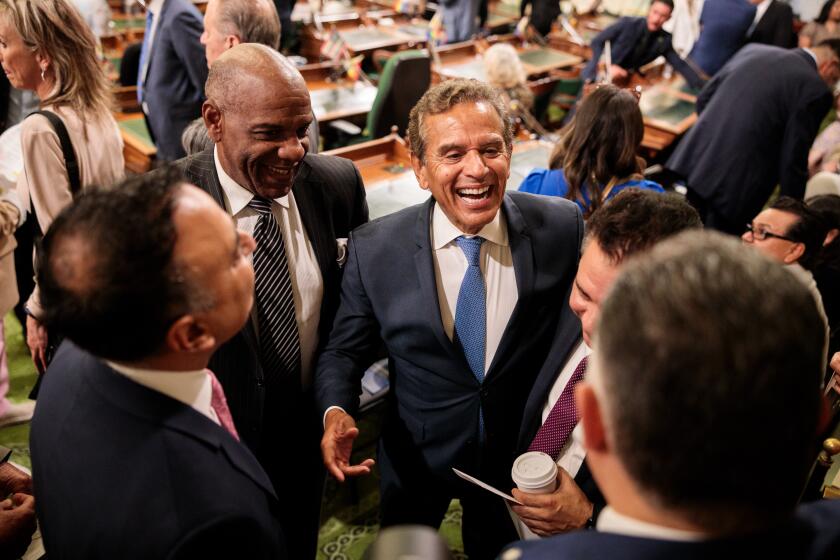U.S. Again Accuses Japanese Chip Firms : Trade Official Warns That Continued Dumping May Jeopardize Pact
A senior U.S. official on Monday accused Japan’s four largest semiconductor makers of continuing to dump their products overseas and warned that the Reagan Administration might cancel a high-technology trade agreement if the pact does not “begin to work, and work fast.”
Speaking to an invited group of Japanese and American journalists at the U.S. Embassy, the government official, who would not allow his name to be used, accused Hitachi, Toshiba, Fujitsu and NEC of selling semiconductor products in third-country markets at less than 40% of the companies’ manufacturing costs.
The official’s comments appear to set a firm tone for a series of high-level trade talks to be held here this week. In the area of semiconductors, the meeting is a follow-up to consultations held in Washington in December, when U.S. officials stressed that they expected to see proof that Japanese companies stopped dumping chips by the end of 1986.
The U.S. chip making industry has been pressing for the U.S. government to be ready with sanctions if Japanese manufacturers fail to comply. But U.S. Commerce Department officials said that a formal process that could take as much as a month must be pursued before any part of the trade agreement could be canceled or before retaliatory measures could be imposed.
Documentation Challenged
In Tokyo, a Japan trade ministry spokesman said the U.S. negotiators have failed to document the charges, and spokesmen for Fujitsu, NEC and Toshiba immediately denied the charges. Osamu Naito of Hitachi said his firm would withhold comment until after the meeting Wednesday and Thursday between Michael B. Smith, deputy U.S. trade representative, and Bruce Smart, undersecretary of commerce, and Makoto Kuroda, Japan’s deputy vice minister of trade.
In his remarks Monday, the senior U.S. official also charged that Japan was failing to carry out another provision of the semiconductor agreement, which specifies that the Ministry of International Trade and Industry will promote a steady increase in purchases of American-made chips until the foreign share in the Japanese market reaches about 20%. In 1985, foreign chip makers, mostly American, sold about 8% of the semiconductors used in Japan.
Since the semiconductor agreement was hammered out July 31, American sales in Japan, the U.S. official charged, “haven’t increased at all, and may have declined.”
He acknowledged that Japanese firms are adhering to provisions of the agreement banning dumping of their products in the U.S. market. But he said the “agreement is in difficulty” because of other violations of the pact.
Two anti-dumping cases and an unfair trade practices complaint against Japanese chip makers were set aside by the trade agreement. If the agreement is suspended, the dumping cases could be reinstated, probably leading to the imposition of duties and possibly other measures.
The U.S. official declined to specify in what countries, or at what prices, the four firms he named are dumping their products. However, U.S. industry officials have complained about prices of chips in Taiwan, Hong Kong, Malaysia, Singapore and Indonesia, which have thriving electronics assembly businesses.
The official said that Fujitsu is selling 256-kilobit D-RAM (dynamic random access memory) chips at 53% of its manufacturing cost, Toshiba is doing the same at less than 50% of cost, and that Hitachi is selling EPROM (erasable-progammable read-only memory) chips at less than 40% of its manufacturing cost. He gave no specifics concerning NEC’s alleged dumping.
Shipments Monitored
Representatives of Fujitsu, Toshiba and NEC said it would be impossible for them to dump chips because they are being monitored by the Japanese ministry of trade.
A ministry official reacted angrily to the U.S. accusations, saying: “We told them that if they have concrete data, show it to us. The U.S. data is very vague.”
The Japanese official countered that it is American, not Japanese, chip makers that are dumping in other markets.
He acknowledged that American semiconductor sales in Japan have not increased, but he said that Japanese chip makers, who themselves are the biggest chip consumers in Japan, were buying more of their own semiconductors to make up for the decline in exports.
Mark Giudici, an analyst at Dataquest, a San Jose market research firm, said prices of the 256K D-RAM chips ranged from $1.80 to $2.30 last week in Taiwan. The high price, he said, is apparently the price at which the Japanese government has suggested the companies sell the chips in third-country markets.
He said the low price reflects gray market activities and low-price Korean products as well as sales by Japanese companies trying to reduce huge inventories. He said that because the Japanese control 80% of the D-RAM market, it is unlikely that American price-cutting could greatly influence the average price.
The senior U.S. official said the Reagan Administration also will join European countries in demanding that Japanese manufacturers of digital audio tape, or DAT, recorders, which are expected to go on the market early this year, install a device to prevent copying. It was the first time U.S. negotiators had raised the issue.
Copyright Worries
Although no U.S. manufacturer has the technology to produce digital audio tape recorders in mass quantities, the U.S. music recording industry is concerned that DAT copying quality, which is of “master disc quality,” may lead to a flood of pirated, top-quality copies of music that would infringe on copyrights. So far, Japanese electronics firms have refused to add the anti-copying device.
The U.S. official also said that negotiations this week on whether American firms will be allowed to bid for contracts on a new $8-billion Osaka Airport “will be important in determining what sort of position the U.S. government takes” on construction opportunities for Japanese firms in the United States.
Sam Jameson reported from Tokyo, and Donna Walters reported from Los Angeles.






